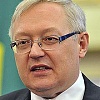TNI editor Jacob Heilbrunn interviews Russian deputy foreign minister Sergei Ryabkov about the New START Treaty and the state of U.S.-Russia relations.
Heilbrunn: The U.S. is pushing very hard against China right now, at least rhetorically. China has vowed to smash any Taiwanese move toward independence and looks to be cracking down in Hong Kong as well. Do you see this as another instance where American overt bellicosity ends up boomeranging and pushing its adversaries to take more drastic measures?
Ryabkov: Of course, it’s not possible for me to judge what China will do in those cases or in those instances, but I do think that every single area where the U.S. believes there is an opportunity to pressure China is being currently used in a most energetic and most forceful manner. I think it clearly entails a further growth of uncertainty in international relations. I still hope though that at some point, the natural instinct to talk and agree and conclude deals will prevail rather than this ongoing effort to squeeze something out of others—not only China, but Russia and others who tend to follow their independent policy from America.
Heilbrunn: In this regard, when it comes to Russia—because you see the U.S. as trying to increase the pressure on Russia as well—do you draw a distinction between President Trump and his administration, or do you see them as aligned in their approach toward Russia? Because during the 2016 election campaign, Trump was explicit about trying to revive the U.S.-Russia relationship.
Ryabkov: No, I see no lines anywhere. I see no distinction, as you have described. Moreover, I see no distinction between the previous administration and this one.
Heilbrunn: Let me put it another way: what about differences between Trump and his own advisers? Do you think Trump himself is inclined to take a more diplomatic route, or do you think that U.S.-Russia policy is being driven by him?
Ryabkov: I don’t know who drives U.S. policy toward Russia. We welcome any signal from the Americans, including from the President himself in favor of improvement, in favor of going along, and we are prepared to bear our share in this. But unfortunately, it doesn’t work. And I suspect to some extent that it’s also my own fear that in my modest position, I was not able to offer anything to my bosses that may help to change things for the better.
Heilbrunn: Final question: do you think that matters, at least in the area of arms control, would change under a Biden presidency? Because the Democrats are much more sympathetic to arms control agreements than Republicans currently appear to be. What’s your take?
Ryabkov: I have no idea how things will unfold in relation to the forthcoming election in the U.S. No predictions, no expectations. I do think, though, that it would be very late in the process for any administration—including the second Trump administration if he is reelected—to deal with the issue of a new START extension after the day of elections in America. I think more broadly that the current, almost one-hundred percent watertight anti-Russian bipartisan consensus in the U.S. doesn’t promise much good for this relationship for the future, irrespective of who wins the next election. So we will see. We will continuously work hard to try to devise alternative paths forward, but we have no partner on the American side.
Source: The National Interest




